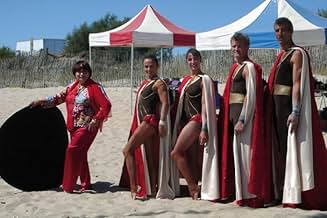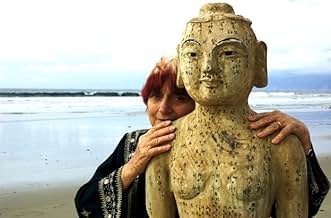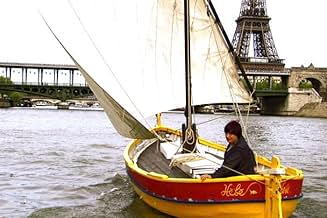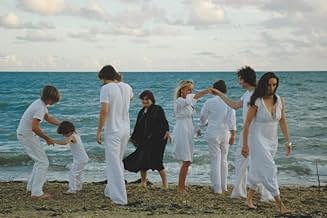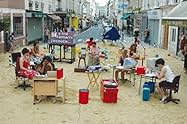AVALIAÇÃO DA IMDb
8,0/10
5,1 mil
SUA AVALIAÇÃO
Agnès Varda explora suas memórias, em sua maioria cronologicamente, com fotografias, clipes de filmes, entrevistas, recriações e cenas contemporâneas engraçadas e divertidas de sua história.Agnès Varda explora suas memórias, em sua maioria cronologicamente, com fotografias, clipes de filmes, entrevistas, recriações e cenas contemporâneas engraçadas e divertidas de sua história.Agnès Varda explora suas memórias, em sua maioria cronologicamente, com fotografias, clipes de filmes, entrevistas, recriações e cenas contemporâneas engraçadas e divertidas de sua história.
- Direção
- Roteiristas
- Artistas
- Prêmios
- 12 vitórias e 13 indicações no total
Gerald Ayres
- Self
- (as Gerry Ayres)
Patricia Louisianna Knop
- Self
- (as Patricia Knop)
- Direção
- Roteiristas
- Elenco e equipe completos
- Produção, bilheteria e muito mais no IMDbPro
Avaliações em destaque
It's not too often a filmmaker will give us a full and unambiguous autobiography on film; if we find out about who they are, he or she will bring themselves into the art that is ostensibly other stories. Agnes Varda looks back on her life using cinema and it is among the most unique things I've ever seen - though it is not inconsistent with many films she has made before (The Gleaners and I comes to mind) as far as her life being inextricably and most often joyfully being connected with her work. This doesn't mean she doesn't shy away from the pain as well; the parts regarding Jacques Demy in his final years are somber and tender.
Pure, unadulterated imagination, heart, empathy, a light yet wholly potent surrealism, a seemingly endless connection to other people, art, photography, and of course those cats (including an eccentric cameo by Chris Marker). I feel like I got a lifetime in just a little under two hours. And how about her cardboard car that she tries to park into her tiny garage!
And it's the kind of wonderful and priceless piece of autobiography that has digressions (one of which about Jim Morrison). It may help to see at least a few of her films before going into this, but even if you only have a cursory knowledge of film history or Demy or what have you, it's still effective and affecting as a story that contains many stories and is about getting us to see the world as vibrantly and daringly as she does.
As life changes and the world goes through other developments, the beaches stay the same.
Pure, unadulterated imagination, heart, empathy, a light yet wholly potent surrealism, a seemingly endless connection to other people, art, photography, and of course those cats (including an eccentric cameo by Chris Marker). I feel like I got a lifetime in just a little under two hours. And how about her cardboard car that she tries to park into her tiny garage!
And it's the kind of wonderful and priceless piece of autobiography that has digressions (one of which about Jim Morrison). It may help to see at least a few of her films before going into this, but even if you only have a cursory knowledge of film history or Demy or what have you, it's still effective and affecting as a story that contains many stories and is about getting us to see the world as vibrantly and daringly as she does.
As life changes and the world goes through other developments, the beaches stay the same.
I was fortunate to catch (October 30, 2009 in SF) "The Beaches of Agnès" aka "Les Plages d'Agnès" 2008, in French with English subtitles. Agnès Varda is 80 (in 2008) and still so lively, creative, imaginative, giving us delightful reminiscing of The New Wave film period, including the young and the old. What a filmmaker, cinematic lover, unique lady, she is. Besides being a retrospective look at Varda's cinematic life (so far), the film also serves as a loving dedication to the close to 30 years she shared with her husband Jacques Demy - the fabulous w-d-filmmaker who gave us the popular French films entirely sung musically: "The Young Girls of Rochefort" 1967 and "The Umbrellas of Cherbourg" 1964 (Catherine Deneuve was in both of these two gems).
If you like movies, film history, graphic design, visual play on imagery (or affiliated to none of the above), you will (still) feel akin to Varda's 'Beaches' whether you thoroughly understands French, speaks the language, been to Paris-France, or not. She has delivered a cinematic journey of going through the various phases of her life, experiences in film-making, and added her unique stamp of Agnès Varda sensibility. It's a good place to be and 'tis fun to hang around with her. As my favorite Emily Dickinson epigram says: Delight has no Competitor, so it is always most. Yes, Agnès Varda is alive and well and still full of humor, bemused or otherwise - a fantastic spirited woman, ever the innovative-discovery eye afresh, so full of wisdom, be it wistful or witty.
This film is a great companion piece for viewing with her loving remembrance of Demy: Jacquot De Nantes (1991), which is in Black & White, and Color, documented the hometown childhood origin which grew into the lifelong cinematic passion of Jacques. Another enjoyable Varda-Demy film, anytime.
There is an accessible official site USA at "cinemaguild.com/beachesofagnes" and the trailer at "cinemaguild.com/beachesofagnes/trailer.html". Looks like DVD is available, released on March 2, 2010.
If you like movies, film history, graphic design, visual play on imagery (or affiliated to none of the above), you will (still) feel akin to Varda's 'Beaches' whether you thoroughly understands French, speaks the language, been to Paris-France, or not. She has delivered a cinematic journey of going through the various phases of her life, experiences in film-making, and added her unique stamp of Agnès Varda sensibility. It's a good place to be and 'tis fun to hang around with her. As my favorite Emily Dickinson epigram says: Delight has no Competitor, so it is always most. Yes, Agnès Varda is alive and well and still full of humor, bemused or otherwise - a fantastic spirited woman, ever the innovative-discovery eye afresh, so full of wisdom, be it wistful or witty.
This film is a great companion piece for viewing with her loving remembrance of Demy: Jacquot De Nantes (1991), which is in Black & White, and Color, documented the hometown childhood origin which grew into the lifelong cinematic passion of Jacques. Another enjoyable Varda-Demy film, anytime.
There is an accessible official site USA at "cinemaguild.com/beachesofagnes" and the trailer at "cinemaguild.com/beachesofagnes/trailer.html". Looks like DVD is available, released on March 2, 2010.
The French movie Les plages d'Agnès was shown in the U.S. with the title The Beaches of Agnès (2008). It was directed by Agnès Varda.
This is a summing up movie, completed by Varda when she was 80 years old. It's really a semi-documentary, but it includes surreal elements that Varda interweaves with commentary, historical movie clips, and direct discussions with the us, the audience.
If you're an Agnès Varda fan, this movie will be perfect. If you've never seen a Varda film, it may not make much sense. Even so, it's interesting, funny, and poignant. If you're not sure, take a chance on it.
We saw the movie at the excellent Dryden Theatre in the George Eastman Museum in Rochester, NY. It was part of an Agnès Varda retrospective, cosponsored by Rochester Institute of Technology and the Eastman Museum. It will work better on the large screen, but it will be satisfactory on the small screen as well.
This is a summing up movie, completed by Varda when she was 80 years old. It's really a semi-documentary, but it includes surreal elements that Varda interweaves with commentary, historical movie clips, and direct discussions with the us, the audience.
If you're an Agnès Varda fan, this movie will be perfect. If you've never seen a Varda film, it may not make much sense. Even so, it's interesting, funny, and poignant. If you're not sure, take a chance on it.
We saw the movie at the excellent Dryden Theatre in the George Eastman Museum in Rochester, NY. It was part of an Agnès Varda retrospective, cosponsored by Rochester Institute of Technology and the Eastman Museum. It will work better on the large screen, but it will be satisfactory on the small screen as well.
"The Beaches of Agnes" is an autobiographical documentary done in a uniquely impressionistic style. The subject is Agnes Varda, the legendary French director who began her career in the 1950s and, who at the age of 80, shows that she is still a master of her art and craft. For not only does Varda provide the voice-over narration for the film, but she conceived and directed the project as well.
Varda uses as her focal point the various beaches where she spent a great deal of her time growing up. It is to these places that she has brought a crew of filmmakers to shoot her delivering extended monologues on her life and to restage - often in a cleverly amusing and surrealistic style - memories and events that have remained with her throughout the years. When she has actual photos and file footage from the past, she is quick to use them, but when she doesn't, she turns to present-day re-creations to fill in the gaps. But all is not limited to the beach, for she frequently heads inland to retrace the steps of her life, visiting key locations along the way.
She explores her childhood, when she lived much of the time on a houseboat; her teen years, when she was thoroughly ignorant of what a woman could do in the world and of the realities of man/woman relationships; her experiences during the War and the Occupation, when most French citizens "lived day to day;" her years studying art at the Ecole du Louvre; her first taste of freedom and independence when she stole off one night all on her own to Corsica; her time spent as a fisherman; her burgeoning fascination with photography; her marriage to fellow director and film-making inspiration, Jacques Demy; her role as mother and grandmother; her trips to Cuba and Southern California in the 1960s to capture in photos and on film the turbulent nature of that period; her fervent pro-feminist leanings that often found their way into her movies; and her eventual transition to film-making herself to become the only female figurehead of the French New Wave, an otherwise Young Boys' Club that included, in addition to Demy, Godard, Truffaut, Resnais, and various other cinematic masters.
It is here that the movie turns to Varda's career as a filmmaker, as the artist herself discusses her inspirations, her key themes and concerns, and the logistical problems of the movie-making process itself. The movie provides us with a generous sampling of clips from not just her own movies but those of Demy as well.
As she reflects back on her life, Varda addresses the issues of aging, memory, and personal loss (especially of her beloved Jacques, who died of AIDS in 1990). She views the sea as representative of permanence - and human beings and their foreshortened life spans as symbols of the universe at its most temporal. Through its mixing of the real with the surreal, the literal with the figurative, "The Beaches of Agnes" mirrors the hybrid nature of Varda's photographic and cinematic works themselves.
But the movie is often at its most charming when it is content to simply BE, when some seemingly random image, person, event or thought comes along to capture Varda's complete and undivided attention - a testament to her astute powers of observation, to her complete and utter absorption in the moment, and to her ability to make art out of the raw materials of actual life.
And isn't that what movie-making is really all about, after all?
Varda uses as her focal point the various beaches where she spent a great deal of her time growing up. It is to these places that she has brought a crew of filmmakers to shoot her delivering extended monologues on her life and to restage - often in a cleverly amusing and surrealistic style - memories and events that have remained with her throughout the years. When she has actual photos and file footage from the past, she is quick to use them, but when she doesn't, she turns to present-day re-creations to fill in the gaps. But all is not limited to the beach, for she frequently heads inland to retrace the steps of her life, visiting key locations along the way.
She explores her childhood, when she lived much of the time on a houseboat; her teen years, when she was thoroughly ignorant of what a woman could do in the world and of the realities of man/woman relationships; her experiences during the War and the Occupation, when most French citizens "lived day to day;" her years studying art at the Ecole du Louvre; her first taste of freedom and independence when she stole off one night all on her own to Corsica; her time spent as a fisherman; her burgeoning fascination with photography; her marriage to fellow director and film-making inspiration, Jacques Demy; her role as mother and grandmother; her trips to Cuba and Southern California in the 1960s to capture in photos and on film the turbulent nature of that period; her fervent pro-feminist leanings that often found their way into her movies; and her eventual transition to film-making herself to become the only female figurehead of the French New Wave, an otherwise Young Boys' Club that included, in addition to Demy, Godard, Truffaut, Resnais, and various other cinematic masters.
It is here that the movie turns to Varda's career as a filmmaker, as the artist herself discusses her inspirations, her key themes and concerns, and the logistical problems of the movie-making process itself. The movie provides us with a generous sampling of clips from not just her own movies but those of Demy as well.
As she reflects back on her life, Varda addresses the issues of aging, memory, and personal loss (especially of her beloved Jacques, who died of AIDS in 1990). She views the sea as representative of permanence - and human beings and their foreshortened life spans as symbols of the universe at its most temporal. Through its mixing of the real with the surreal, the literal with the figurative, "The Beaches of Agnes" mirrors the hybrid nature of Varda's photographic and cinematic works themselves.
But the movie is often at its most charming when it is content to simply BE, when some seemingly random image, person, event or thought comes along to capture Varda's complete and undivided attention - a testament to her astute powers of observation, to her complete and utter absorption in the moment, and to her ability to make art out of the raw materials of actual life.
And isn't that what movie-making is really all about, after all?
Agnès Varda presented us in this autobiographical movie with her memories of a life devoted to the cinema and not only. She does that in powerful and beautiful images supported by a brilliant, witty and sensitive commentary. In this movie we can see references to several of some of the best Varda's films such as La Pointe Courte, Cléo de 5 à 7 and Le Bonheur, with images, and to some of the greatest and more important figures of French cinema such as her husband Jacques Demy to begin with and also Godard, Catherine Deneuve, Michel Piccoli, Jane Birkin and others. The cut is very intelligent and effective in visual terms combining the present and the past sometimes in simultaneous images with a special effect here and there. A masterpiece indeed.
Você sabia?
- CuriosidadesFrench visa # 118156.
- ConexõesEdited into Filme Socialismo (2010)
Principais escolhas
Faça login para avaliar e ver a lista de recomendações personalizadas
- How long is The Beaches of Agnès?Fornecido pela Alexa
Detalhes
- Data de lançamento
- País de origem
- Centrais de atendimento oficiais
- Idiomas
- Também conhecido como
- The Beaches of Agnès
- Locações de filme
- Empresas de produção
- Consulte mais créditos da empresa na IMDbPro
Bilheteria
- Orçamento
- € 1.900.000 (estimativa)
- Faturamento bruto nos EUA e Canadá
- US$ 239.711
- Fim de semana de estreia nos EUA e Canadá
- US$ 19.032
- 5 de jul. de 2009
- Faturamento bruto mundial
- US$ 2.235.006
- Tempo de duração1 hora 52 minutos
- Cor
- Proporção
- 1.85 : 1
Contribua para esta página
Sugerir uma alteração ou adicionar conteúdo ausente

Principal brecha
By what name was As Praias de Agnès (2008) officially released in India in English?
Responda
![Assistir a Bande-annonce [OV]](https://m.media-amazon.com/images/M/MV5BZGYxNzE1MDgtYjIzMy00NmY0LTkyMmItMTFkZjVlNmMyNTVmXkEyXkFqcGdeQXRyYW5zY29kZS13b3JrZmxvdw@@._V1_QL75_UX500_CR0)



